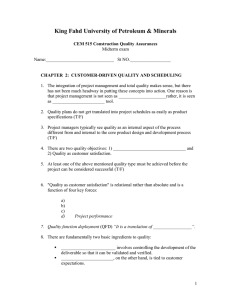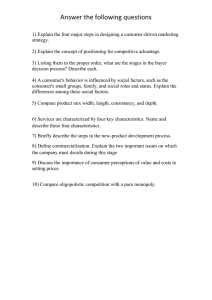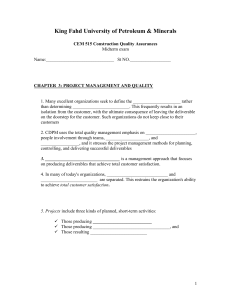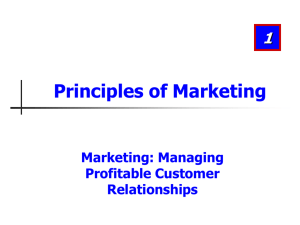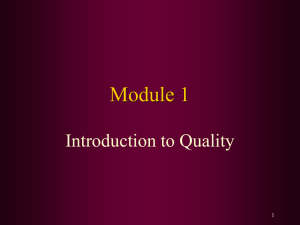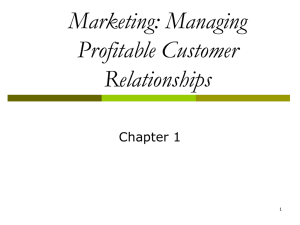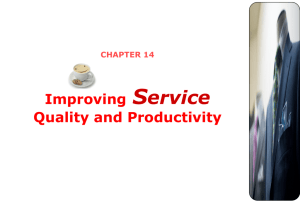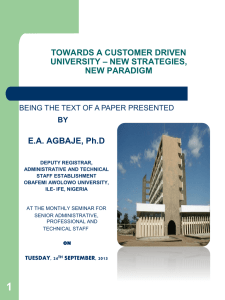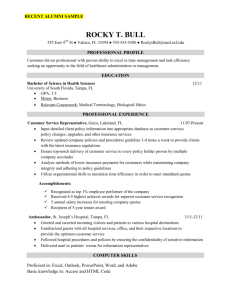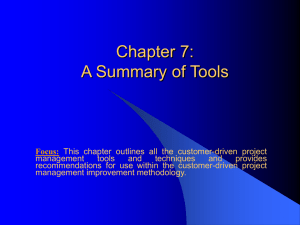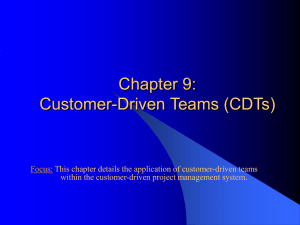King Fahd University of Petroleum & Minerals
advertisement
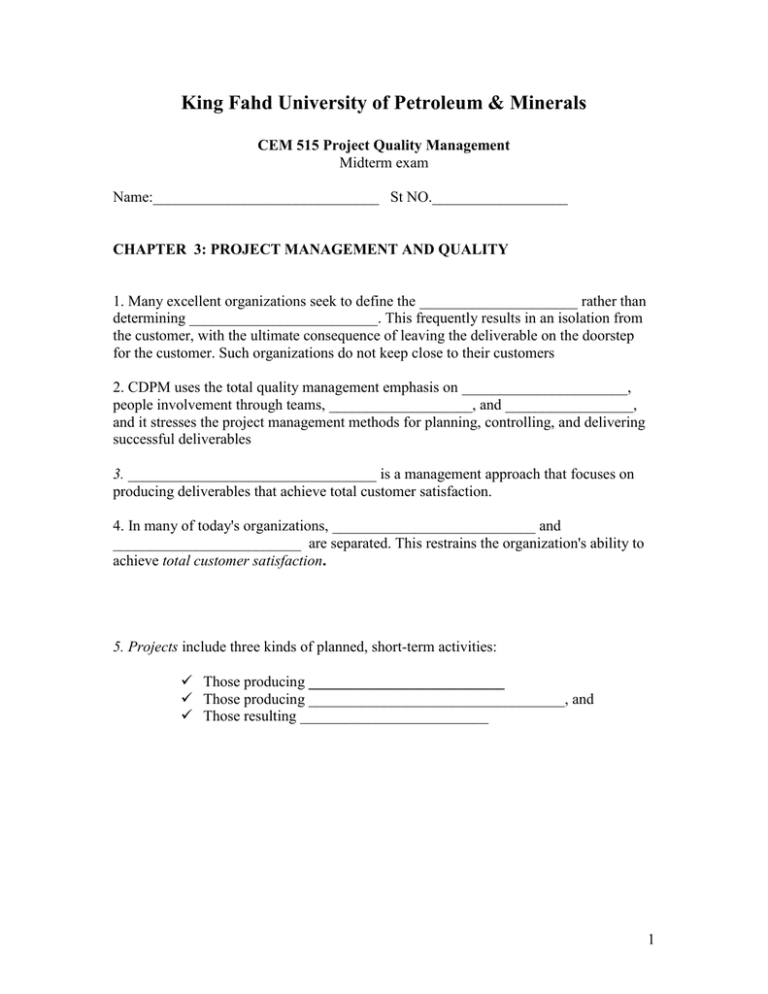
King Fahd University of Petroleum & Minerals CEM 515 Project Quality Management Midterm exam Name:______________________________ St NO.__________________ CHAPTER 3: PROJECT MANAGEMENT AND QUALITY 1. Many excellent organizations seek to define the _____________________ rather than determining _________________________. This frequently results in an isolation from the customer, with the ultimate consequence of leaving the deliverable on the doorstep for the customer. Such organizations do not keep close to their customers 2. CDPM uses the total quality management emphasis on ______________________, people involvement through teams, ___________________, and _________________, and it stresses the project management methods for planning, controlling, and delivering successful deliverables 3. _________________________________ is a management approach that focuses on producing deliverables that achieve total customer satisfaction. 4. In many of today's organizations, ___________________________ and _________________________ are separated. This restrains the organization's ability to achieve total customer satisfaction. 5. Projects include three kinds of planned, short-term activities: Those producing __________________________ Those producing __________________________________, and Those resulting _________________________ 1 6. Name the following figures/graphs 7. Customer-driven project management stresses: – ____________________________________ – Right-sized and team-based organizations, and – _____________________________________ 2 8. The new millennium has introduced a new stage in the development of project management-we call it "________________________________” 9. Project management became necessary because traditional organizations structured around functional activities, such as engineering, manufacturing, support, finance, and human resources, could ____________________________________ projects. 10. According to project management standards, a successful project is one that is completed on __________ and within_____________ and meets _________________ criteria. 11. _________________ means the customer or customer's voice is the primary focus. 12.________________ is any series of activities that has a specific end or objective. 13. __________________ involves optimizing resources, that is, getting the most out of both technology and people. 14. The customer-driven project management life cycle includes: – – – – – Concept __________________ __________________ __________________ __________________ 15. The CDPM improvement methodology consists of the following eight steps: 1 Define quality issues. 2 ________________________. 3 Select improvement opportunities. 4 ____________________________. 5 Take action. 6 _____________________________ 7 Implement the . improvement. 8 ______________________________. 16. CDPM is a process that is wholly driven by the _______________ at every turn and which places the customer in _______________________ from start to finish 3 CHAPTER 5: Leadership and Quality 1. The _______________ describes the basic corporate view of the role and function of the organization in satisfying customers' expectations today and in the future. 2._____________ are the collective concept of what is important and what is "right" about the organization. 3. Specifically leaders do the following: Leaders create _______________ Leaders create _______________ Leaders give structure Leaders set the example Leaders grow _________________ Leaders establish and maintain organizational systems 4. The creation of a VICTORY environment requires the following elements: – – – – – – – V________ and the ________________ to make it happen I___________________________________ C________________________________ T______________ and ____________________ O______________________ R_______________ and __________________ Y_______________________________ 5. In a TQM environment, all the people in the organization must be ______________ to perform their work with excellence. 6. In continuous improvement, _____________ are not the problem, ____________ are the solution. 7. ____________________ are the principal means to make decisions. 4 8. Name the following figures/graphs 9. The development of a mission statement starts at the bottom (True/False) 10. Training and Education: Specifically, the key skills that must be developed for a TQM environment include: – – – – – – – – __________________________________; __________________________________; Conflict management; Problem solving; Consensus decision making; Critical and systems thinking; Understanding customer needs; and __________________________________. 11. ______________________ is the process of enabling employees at all levels to exercise wide discretion in meeting customer needs, both within the outside the organization. 12. ______________________ is the process of setting boundaries on that discretion, through guidelines, so that employees are clear on the extent of empowerment. 13. Rewards can be extrinsic, such as _________________________________, 14. Rewards can be intrinsic, such as _________________________________ 5 15. Project management system involves the following major processes: 1. 2. 3. 4. Analysis Planning _______________________ Evaluation Chapter 6: The Eight Step Process 1. The eight phases of the customer-driven project management improvement methodology are: Phase 1: ___________________________ Phase 2: Understand and define the process Phase 3: ____________________________ Phase 4: Analyze the improvement opportunities Phase 5: ______________________________ Phase 6: Check results Phase 7: ______________________________ Phase 8: Monitor results Chapter 7 (A Summary of Tools) Complete the missing words (1 point each) 1) Customer-driven teams are the primary technique for performing customer-driven project management. Customer-driven teams are as follows: a. Customer-driven _______________________. These are customer-driven teams whose purpose is to complete a specific project, program, or task. b. Customer-driven _______________________. These customer-driven teams focus on improving a specific process. c. Customer-driven _______________. These customer-driven teams constantly perform and improve their particular process. 2) ____________________ are a group of people working together toward a common goal. 3) ____________________ is a technique where the individual team members work together to achieve a common goal. 6 4) ____________________ is a communication technique for receiving and understanding information. 5) _____________________ is a technique to establish a focus on a specific outcome. 6) _____________________ is a tool that encourages the collective thinking power of a group to create ideas. 7) ___________________ is a disciplined approach for listening to the voice of the customer to get customer requirements that are converted into deliverable conditions. 8) __________________ is a method of measuring your organization against those of recognized leaders. 9) ___________________ are meaningful measures that target continuous process improvement actions. 10) ________________ is a technique to determine majority opinion. 11) ___________________ is a tool for rating problems, opportunities, or alternatives based on specific criteria. 12) ______________________ is a tool for comparing each problem, opportunity, or alternative against all others. 13) ______________________ is a technique for getting a team to accept and support a decision. 14) _________________ is a tool to improve the process and reduce process cycle time by eliminating non-value-added activities and/or simplifying the process. 15) _____________________ is a tool that shows a picture of how work actually flows through an organization or facility. 16) __________________ is a technique that describes the forces at work in a given situation. 17) ________________________. The work breakdown structure defines the organization and coding of the deliverable. 7 18) ___________________ is a technique for planning, scheduling, and controlling time and estimating, budgeting, and controlling resources. 19) ______________________ is the continual assessment of threat or opportunity in terms of time, cost, technical feasibility, and customer satisfaction. 20) __________________ are techniques to identify cost of conformance and nonconformance. 8
